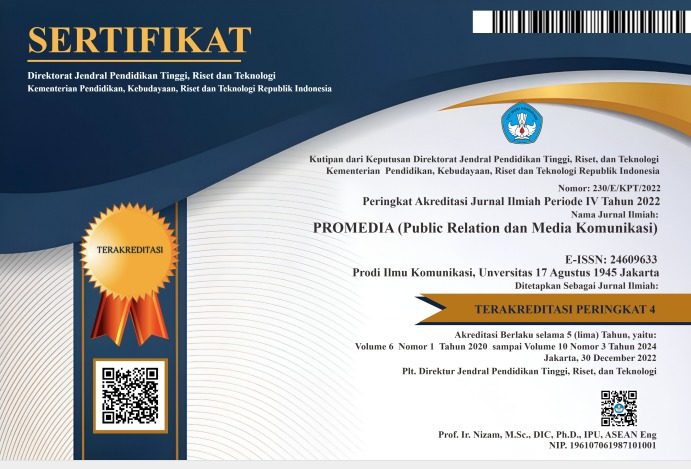Literature Riview: Hiperrealitas Komunikasi Gen Z dalam Media Sosial
Abstract
Abstract
The development of communication technology has significantly transformed how Generation Z constructs identity and communicates on social media. The phenomenon of hyperreality has become a key aspect of their digital interactions, where the curated online image often overshadows real-life experiences. This article examines how social media platforms, particularly Instagram and TikTok, serve as spaces for hyperreality, influencing identity construction and social validation among Gen Z.
This research employs a literature review method with a systematic approach based on PRISMA, enabling an in-depth analysis of prior studies on hyperreality in digital communication. Data is collected from academic sources discussing identity construction, performative communication, and the social impact of digital media on Gen Z.
The findings reveal that Gen Z undergoes changes in communication style due to continuous exposure to social media trends, where their digital identity is often curated and modified rather than reflecting reality. The simulated reality built on Instagram and TikTok affects social interactions and amplifies the pressure to maintain a specific image. The Fear of Missing Out (FoMO) phenomenon further reinforces Gen Z’s engagement in hyperreality, driving social conformity and digital anxiety.
The study concludes that Gen Z needs greater digital awareness and media literacy education to comprehend the psychological and social impacts of identity construction in digital spaces. Additionally, ethical regulations concerning platform algorithms should be further examined to reduce social pressures and ensure a healthier digital experience. By adopting a more critical approach to digital content consumption and creation, Gen Z can foster a more balanced relationship with the online world without being trapped in hyperreal simulations.Full Text:
PDF (Bahasa Indonesia)DOI: https://doi.org/10.52447/promedia.v11i1.8312
Refbacks
- There are currently no refbacks.
 |  |  |  |
 |  |  |  |
 |  |  |


